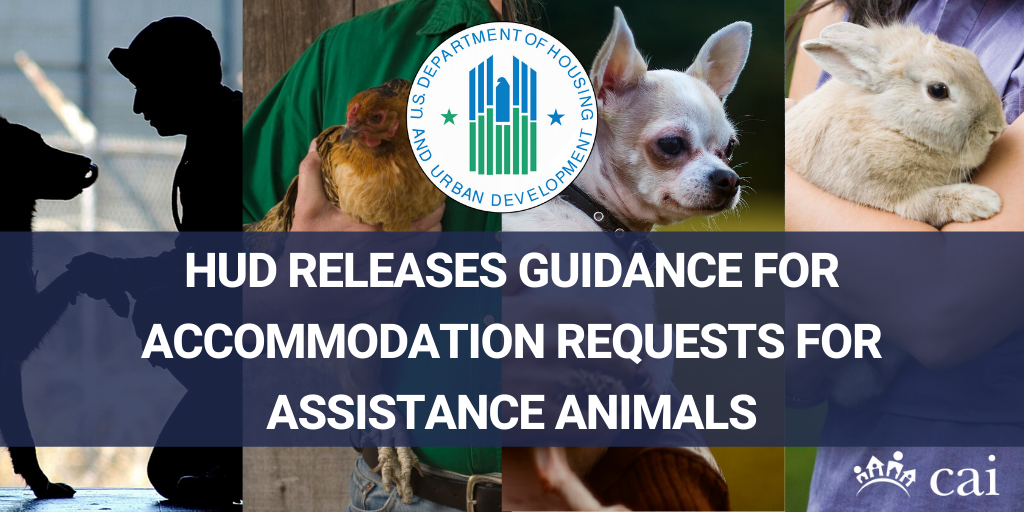Agency clarifies whether internet certificates are valid and the types of animals that can provide emotional support
The U.S. Department of Housing and Urban Development (HUD) released guidance yesterday for individuals requesting an accommodation for an assistance animal and housing providers responding to these requests under the Fair Housing Act (FHA).
According to HUD, FHA complaints concerning denial of reasonable accommodations and disability access comprise almost 60% of all FHA complaints and those involving requests for reasonable accommodations for assistance animals are significantly increasing. These complaints are one of the most common that HUD receives.
HUD’s guidance does not expand or alter housing providers’ obligations under FHA or HUD’s implementing regulations. It is a tool for housing providers and persons with a disability to use at their discretion. The document also provides best practices for addressing requests for reasonable accommodations to keep animals in housing where individuals with disabilities reside or seek to reside. HUD recommends its new guidance be read together with its regulations prohibiting discrimination under FHA.
The goal of the guidance is to make it easier for housing providers and individuals requesting an accommodation for an assistance animal to better understand what legal steps need to be taken to secure a reasonable accommodation, especially when discussing a disability that is not readily discernable.
A few highlights of the HUD guidance include:
ACCOMMODATION REQUEST: While it is not necessary to submit a written request or to use the words “reasonable accommodation,” “assistance animal,” or any other special words to request a reasonable accommodation under the FHA, persons making a request are encouraged to do so in order to avoid miscommunications.
Certain impairments, however, especially including impairments that may form the basis for a request for an emotional support animal, may not be observable. In those instances, a housing provider may request information regarding both the disability and the disability-related need for the animal. Housing providers are not entitled to know an individual’s diagnosis.
DOCUMENTATION FROM THE INTERNET: Some websites sell certificates, registrations, and licensing documents for assistance animals to anyone who answers certain questions or participates in a short interview and pays a fee. Under the Fair Housing Act, a housing provider may request reliable documentation when an individual requesting a reasonable accommodation has a disability and disability-related need for an accommodation that are not obvious or otherwise known. In HUD’s experience, such documentation from the internet is not, by itself, sufficient to reliably establish that an individual has a non-observable disability or disability-related need for an assistance animal.
By contrast, many legitimate, licensed health care professionals deliver services remotely, including over the internet. One reliable form of documentation is a note from a person’s health care professional that confirms a person’s disability and/or need for an animal when the provider has personal knowledge of the individual.
TYPE OF ANIMALS
HUD also clarifies the types of animals that may be associated with emotional support or other assistance. The guidance differentiates between animals that are typically found in households (dogs, cats, etc.) and “unique” animals that do not typically live in a home, such as livestock. An individual seeking a reasonable accommodation for a “unique” animal will face a “substantial burden” in demonstrating how this animal directly meets a disability related need.
CAI will continue to study these guidance documents. We are committed to preparing additional resources for members to understand and use as they consider accommodation requests.
Resources



